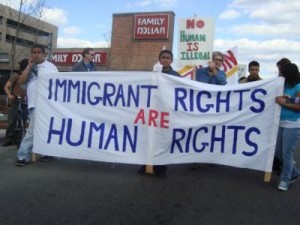Immigration, Amnesty, and the Rule of Law
 In the ongoing Kentucky U.S. Senate race, both candidates have accused the other of supporting “amnesty” for “illegal immigrants” and of not upholding the rule of law.
In the ongoing Kentucky U.S. Senate race, both candidates have accused the other of supporting “amnesty” for “illegal immigrants” and of not upholding the rule of law.
Immigration is a complex issue, and the laws governing it are even more complex. Political campaigns, at least in our day, are not well-suited to serious debates about complex policy questions. Accusations are made against seemingly everyone, including the U.S. Catholic Bishops, of ignoring national security or seeking to undermine the moral and legal order
What are the facts?
To begin, it is important to point out that no one these days is really talking about “amnesty.” Granting amnesty means wiping the slate clean and automatically granting some form of legal status. All proposals for immigration reform that have been seriously considered in the last decade reject amnesty in favor of an earned path to citizenship.
What is the difference? An earned path to citizenship involves a recognition that a person is in an irregular legal situation and perhaps even committed a federal crime by entering the country in violation of the law. A just penalty is imposed, along with other requirements, such as additional fines, demonstrated progress in learning English, and a waiting period so that being in the country already is not an advantage over those seeking to immigrate from the same countries.
The bill that passed the U.S. Senate in 2013 took this approach, along with an additional initial waiting period while border enforcement was enhanced. The U.S. Conference of Catholic Bishops supports this idea, provided the conditions are not so onerous as to make them impossible for many to comply with.
Perhaps the greatest misunderstanding one encounters in the general population is the idea that anyone can immigrate legally, as long as he or she fills out the proper forms and waits a reasonable time for approval. This is simply not the case. Congress has enacted a system of annual visa quotas for various countries that are often so insufficient that an applicant may encounter a wait of many years, in some cases even decades.
The U.S. Bishops do not support, as some charge, an “open border” where there is no legal enforcement and where national security is ignored. It is a principle of Catholic teaching on migration that countries have a right and a duty to appropriately secure their borders.
What the bishops do support is a comprehensive reform of the legal immigration process that is focused on providing safe haven for those in extreme hardship, as well as those seeking to be reunited with their families. In addition, to the extent the economic and security situation allows, people have a right to migrate to seek a better life for themselves and their families. Historically, few nations have embraced this final principle more fully than the United States.
We are a nation of immigrants and a land of opportunity. We must never lose that aspect of our identity.
One of the most divisive immigration issues of the past year has been the arrival of tens of thousands of unaccompanied minors from Central America. Some argue that it is imperative we send all of these kids home. Yet, it is this position that ignores the rule of law.
The truth is that many of these children have a legal claim to entry into the United States. And, of course, many do not. What the bishops have advocated for is not a blanket amnesty, but for the resources required to provide each child a legal hearing, with representation, to determine their status under the law. Those who have a valid claim would then be granted legal status. That is how legal immigration works.
To explore this complex issue further, please visit justiceforimmigrants.org. Justice for Immigrants is the immigration advocacy organization founded by the U.S. Bishops to support immigration reform during the Bush administration. Because that work remains undone, JFI has continued to work and is a wonderful resource.
In summary, it is important to remember that human dignity and the importance of the family are not principles that only apply when the federal government decides to issue a piece of paper. The justice of our immigration system is determined by how often these principles are respected and how often they are not. There is nothing sacrosanct about current immigration law. It can be improved to better reflect our values, and so it should.

